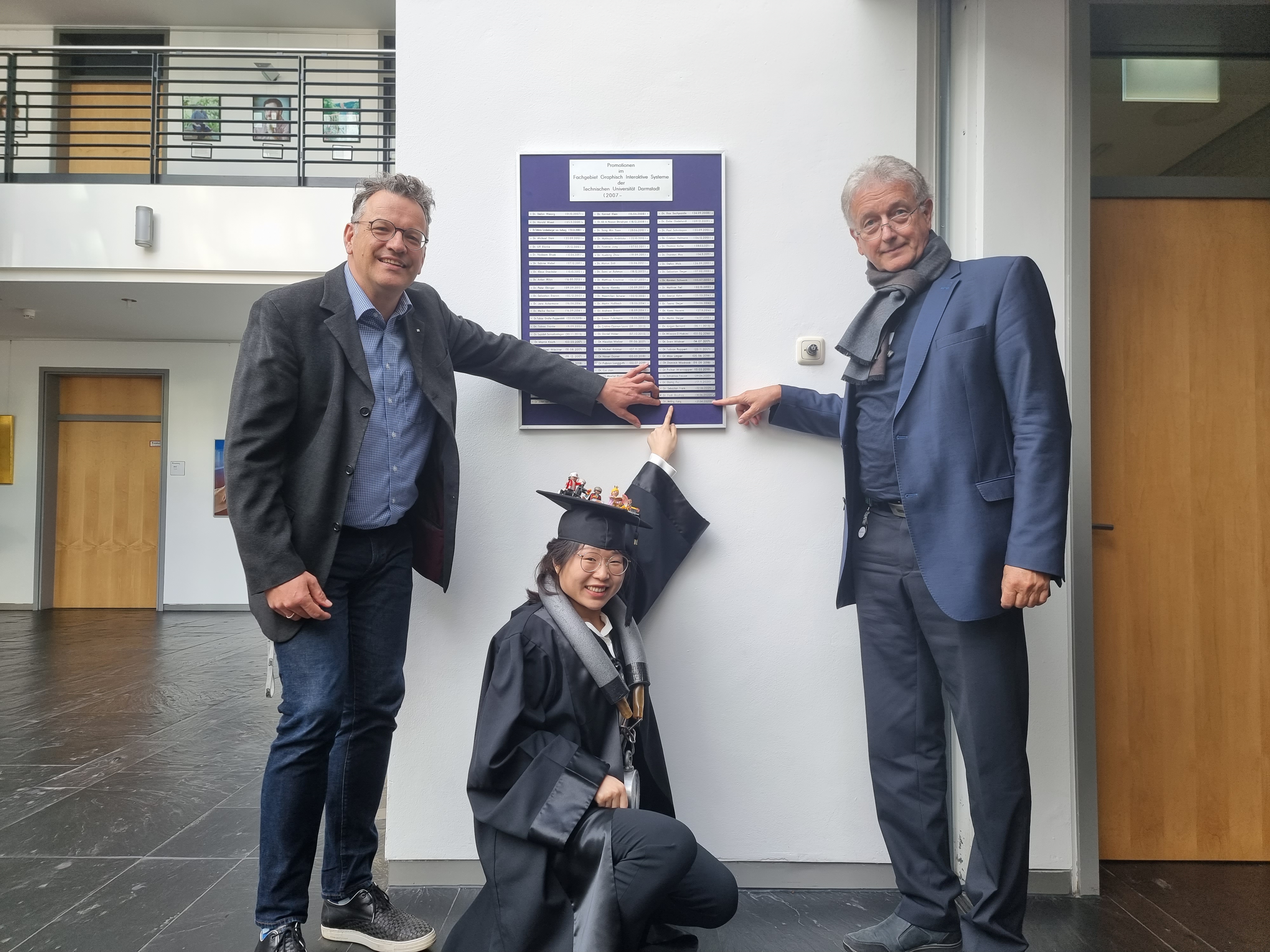Promotion of Meiling Fang
The dissertation deals with the problem of presentation attacks in biometric recognition systems and their automatic detection (PAD). Two main problems are the fairness of the algorithms with respect to personal attributes and the generalisability to unknown attack types and environments. The paper presents new methods for data augmentation and processing to improve the fairness and generalisability of PAD algorithms for face and iris recognition. Effects of masks on recognition are also investigated and solutions are presented.
Meiling Fang, research assistant in the department "Smart Living and Biometric Technologies" successfully defended her dissertation on 21 April 2023 - congratulations!
The public defence of the dissertation on "Boosting the Generalizability and Fairness of Presentation Attack Detection" took place at Fraunhofer IGD in Darmstadt and online.
Dissertation abstract
The vulnerability of biometric recognition to presentation attacks (PAs) has been widely recognized and has attracted increasing attention as it enables attackers to impersonate authentic users. Presentation attack detection (PAD), aiming at automatically catching PAs, is an essential technology to secure biometric systems from PAs such as printed photos and replayed videos. Despite the considerable exploration and remarkable progress in PAD performance, two major issues still constitute a gap in technology. The first is the lack of proper understanding of the fairness of such algorithms over human-related attributes, and the second is the low performance generalizability over variabilities such as unknown attack types and capture environments. These challenges drive the main contributions of this thesis towards analyzing and boosting the fairness and generalizability of PAD.
PAD fairness over different human attributes is extremely understudied. Such underexploration is mainly due to the lack of suitable data. Towards enabling the fairness assessment and enhancement in face PAD, this thesis first introduces a combined attribute annotated PAD dataset, including both demographic and non-demographic attribute labels. Meanwhile, this thesis presents a new metric, accuracy balanced fairness, to simultaneously represent both the PAD fairness and the absolute PAD performance. Then, a comprehensive analysis of fairness in face PAD is conducted to study its relation to the nature of training data and the methodology of decision threshold selection. Guided by the outcomes of these analyses, a data augmentation method, namely FairSWAP, is successfully proposed to enhance the fairness of face PAD.
In addition to the PAD generalizability over human-related attributes, seen as fairness, another emerging challenge that encountered face PAD during the COVID-19 pandemic is the PAD generalizability to subjects wearing facial masks. To address this issue, this thesis first provides a collaborative real mask attack dataset involving the conventional unmasked bona fide and attacks, masked bona fide sample, novel attacks with faces wearing masks, and attacks with real masks placed on spoof faces. This thesis performs a set of extensive experiments to investigate the impact of masked faces on recognition vulnerability and PAD behaviour. Observing the degradation of PAD performance caused by the facial masks, this thesis presents a solution to target this issue by refining the partial attack supervision and the regional weighted inference.
The third part of this thesis targets the more conventional PAD generalizability issues, such as variabilities in attack creation and capture scenarios. Aiming to boost the generalizability of face PAD, this thesis proposes to leverage the information from the frequency domain in an optimized manner, assisting the information in the spatial domain to learn a more generalized representation under intra-dataset and cross-dataset settings. With a focus on enhancing the generalizability of iris PAD, this thesis proposes a micro-stripe analyses solution that leverages the benefit of the spatially aware processing of well-defined regions in the iris and its border with the sclera. This thesis further introduces a novel attention-based deep pixel-wise binary supervision method, A-PBS, for iris PAD. This solution aims to capture the fine-grained pixel/patch-level attack clues and automatically locate regions that contribute the most to an accurate PAD decision. The generalizability of the proposed iris PAD solutions is demonstrated under real-world cross-testing cases, including cross-attack, cross-dataset, and cross-spectrum settings.
To summarize, this thesis first provides a much-needed comprehensive analysis of fairness in PAD, leading to a well-founded and integrable fairness enhancement solution. Then, it presents detailed investigations of the masked face PAD challenge along with a technical solution towards improving the masked face PAD performance. The thesis then presents a set of novel contributions to boost the generalizability of face and iris PAD techniques. This thesis thus yields practically-aware advancements in understanding and mitigating vulnerabilities of biometric systems and lays the groundwork for future research into developing and deploying generalized PAD systems.
 Fraunhofer Institute for Computer Graphics Research IGD
Fraunhofer Institute for Computer Graphics Research IGD